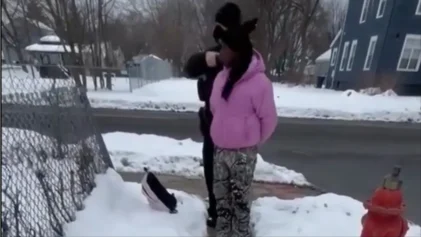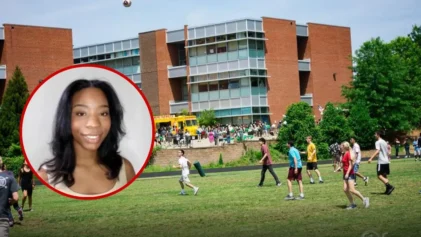Prosecutors have dropped their case against two Atlanta officers who had been charged in the fatal shooting a Black man outside of a fast-food restaurant during the summer of 2020. Experts informed the authorities’ decision to exonerate the cops, saying a comprehensive look at multiple cameras from a variety of perspectives supported the decision to use deadly force.
On Tuesday, Aug. 23, prosecutors said Officers Garrett Rolfe and Devin Brosnan, cops from the Atlanta Police Department involved in the death of Rayshard Brooks, followed procedure during the sequence of events that led one of them to gun down the unarmed man they were trying to arrest. The investigation into the case lasted over two years from the date of the altercation that took the life of the young father.
Brooks, 27, was shot, after fighting and taking a police-issued Taser from an officer outside of an Atlanta Wendy’s on June 12, 2020.
Rolfe faced 11 criminal charges including felony murder, aggravated assault, and more. Brosnan was charged with aggravated assault and two counts of violation of oath of office.
Pete Skandalakis, the Prosecuting Attorneys’ Council of Georgia executive director, presented the facts of the case in a news conference sharing videos starting with the beginning of the altercation, where Brooks was passed out in the drive-thru lane of the restaurant until the man’s violent demise.
Skandalakis — who inherited the case as a special prosecutor when Fulton County District Attorney Fani Willis recused her office from the prosecution last year — said the determination of their fate was based on the fact the officers “acted within the scope of their duties” and considered their use of deadly force “reasonable.”
“Both acted as reasonable officers would under the facts and circumstances of the events of that night,” Skandalakis said. “Both acted in accordance with well-established law and were justified in the use of force regarding the situation.”
Skandalakis said the investigators had to “look at the totality of the circumstances. What did the officer know in that time, in that moment, in that split second,” to decide exoneration.
First of the circumstances to consider was Brooks was intoxicated. Officers, after getting him to move from the drive-thru to a parking spot, noticed he smelled like alcohol and had “glassy” eyes. Toxicology testing would later find traces of cocaine and ecstasy in Brooks’ system in addition to alcohol.
The composite of videos includes surveillance cameras from Wendy’s, patrol vehicle cameras, officer bodycams, and multiple civilian cellphone videos. The altercation based on all of the videos lasted around 90 minutes.
To complete the report, the department reached out to outside experts to help break down the shooting frame-by-frame. Danny Porter, the former Gwinnett County District Attorney, was one of those brought in. (Porter, when asked, noted to a reporter that all of the analysts who worked with him were white.) Trauma and stress experts were also brought in for the prosecution.
During the news conference, authorities zeroed in on Brooks’ actions, including him fighting both of the officers, trying to run away from the officers, and at one point aiming a taser he grabbed from Rolfe at the rightful owner’s head.
This is the first time Brooks uses the Taser and Rolfe is seen on video blocking it with his hand.
The second time he uses it, he is shooting it as he runs. This is right before Rolfe shoots Brooks to death.
According to state law, Georgia officers are permitted to use deadly force if the suspect possesses a deadly weapon and if the badge believes the suspect poses an immediate threat to their lives or the lives of other officers.
“It’s my finding that Rolfe acted within accordance with Georgia law,” the expert stated. “It’s my conclusion that the use of deadly force was reasonable.”
Authorities maintained the shooting had nothing to do with race, despite the incident happening in the throes of the 2020 summer of unrest, where cities were upended with civil protest against police brutality. A month prior to Brooks’ death George Floyd had been murdered, setting off national and international demonstrations lifting “Black Lives Matter.”
At the press conference, Skandalakis proclaimed, “Black lives do matter,” but wants people to see that these cases were not the same.
“I understand that the encounters between police and the African-American community at times are very volatile,” he continued. “But I would ask them to look at the facts of this case, and this isn’t one of those cases. This is a case in which the officers were willing to give Mr. Brooks every benefit of the doubt and unfortunately, by his actions, this is what happened.”
“This is not a case in which an officer was kneeling on a prone suspect for nine minutes, nor was it like the Ahmaud Arbery case, where armed citizens were chasing a young man through a neighborhood,” Skandalakis said.
Skandalakis said the city will now “file in Fulton County an administrative dismissal in which we will be dismissing all the warrants” against Rolfe and Brosnan.
The Georgia NAACP president Gerald Griggs said he thinks, Skandalakis and Porter, made a bad decision.
“We need to present this case to a grand jury because only the citizens of Fulton County should determine if this case should proceed forward,” Griggs said.
Criminal defense attorney Darryl Cohen also disagreed about the decision, saying the former Fulton DA Paul Howard “overreached and overstepped” when he set the original charges. Because they were so vast the authorities could not bring the counts to the grand jury.
According to 11 Alive, attorneys representing Brooks’ family hosted a news conference hours after the city’s decision at the Stewart Miller Simmons Trial Attorneys’ offices.
L. Chris Stewart said, “It’s not about the findings, it is about the process.”
“One finding from a District Attorney (pictures, exhibits, breakdown of videos) finding guilt, finding them at fault,” he said. “And then today, we watch another District Attorney finding totally different results with the same facts.”
He said it was confusing before asking, “How is that possible?”
The lawyer spoke about the fight that occurred between Brooks and the officers and said “No one should ever fight with the police.” However, he added, it was during the fight the officers were justified in using deadly force.
“They chose not to. They decided to use it as a man was running away … 19 feet away.”
Both officers are still members of the APD. Brosnan never left the force but was reassigned to administrative duty. Rolfe was fired but rejoined in 2021 after a city board determined his firing did not follow department protocol. He, too, has been assigned administrative duties.
It is anticipated they will be reintroduced to patrol duties after they “undergo Georgia P.O.S.T. recertification and training.”
The APD released a statement about the decision, saying, “We have faith in the criminal justice system, and we respect the special prosecutor’s decision in this case.”


